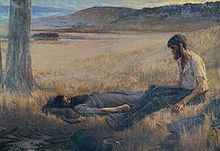Robert O'Hara Burke
Robert O'Hara Burke (* 1821 in St. Clerans , County Galway , Ireland ; † June 30, 1861 at Cooper Creek , South Australia ) was a police officer in Melbourne . He was the leader of the first south-north crossing of Australia from Melbourne to the Gulf of Carpentaria by Europeans in 1860/61.
Life
Burke was an officer in the Austrian cavalry, then served in the Irish police and emigrated to Australia in 1853. There he became police superintendent in Melbourne, which at that time had become rich from gold discoveries and was growing rapidly.
After Augustus Gregory had explored the interior of Australia in 1858, a committee was formed in Melbourne to prepare an expedition to cross the continent. Gregory was supposed to be the expedition leader, but declined. The committee then looked for an expedition leader via a newspaper advertisement. Burke was chosen from among fifteen applicants. Although he had no experience of expedition, his charming and extravagant demeanor evidently won over the committee.
→ Main article: Burke and Wills expedition
The expedition left Melbourne on August 20 with a total of 19 participants, 27 Australian camels and 23 horses. In March, John McDouall Stuart set out from Adelaide to be the first to reach the north coast. For political reasons, crossing Australia became a race between the states of South Australia and Victoria. Both colonies wanted a port on the north coast to trade with Asia and they wanted a telegraph line direct to their capitals, which would have promised them great influence.
Already in the initial phase there were differences in the expedition team, so that Burke's deputy, George James Landells, resigned and returned to Melbourne, whereby William John Wills became deputy expedition leader. In October they reached Menindee , a small settlement on the Darling River . Midsummer in Australia was imminent and the team was undecided whether to move on. Burke split the force in two and went ahead with a few men. In addition to Wills, these were Charlie Gray, John King, William Brahe and the bush experienced William Wright. They crossed the Broken Hill plain and passed the Aboriginal sanctuary of Mootwingee .
On October 29th, Burke sent Wright back to Menindee to pick up the rest of the team. Burke and his men reached Cooper Creek on November 11th , where they made camp and waited for Wright. When after more than a month they still had no sign of life from him, Burke, Wills, King and Gray moved further north on December 16. Brahe stayed in camp to wait for Wright.
After a long and arduous walk, on February 10th they reached a river, the Flinders River , whose water tasted salty. They used this as an indication that they were near its confluence with the Carpentaria Gulf . With that they had achieved their goal - first, because Stuart, Burke's rival, had had to give up. However, the mangrove swamps along the coast prevented them from seeing the sea. So they started their way back on February 12th.
The way back was even more difficult than the way there. They had to slaughter their horse and four of their camels. On April 17th, one of the men, Charlie Gray, died. Four days later they reached their camp on Cooper Creek. There they discovered that the fireplace the other group was using was still warm. So she must have left that day. A message from Brahe, carved into a tree, indicated that Wright never showed up and that Brahe and his group had left the camp after such a long time to move south.
Since they would never have caught up with the other group (they were far slower than the others after thousands of miles across the desert), Burke, Wills and King decided to follow Cooper Creek southwest to Mount Hopeless Police Station, 150 miles away . The road became a death march. On June 29th, King and Burke had to leave the dying Wills behind for help. Burke collapsed en route and probably died of starvation and heat early the next morning. King then returned to Wills and found him also dead. King himself was rescued by Aborigines and discovered on September 15 at Cooper Creek by a rescue team under Alfred William Howitt from Melbourne.
literature
- Sarah Murgatroyd: In the land of the green ants. The first crossing of Australia. Goldmann Publishing House
See also
Web links
| personal data | |
|---|---|
| SURNAME | Burke, Robert O'Hara |
| BRIEF DESCRIPTION | Expedition leader of the first south-north crossing of Australia |
| DATE OF BIRTH | 1821 |
| PLACE OF BIRTH | St. Clerans , County Galway , Ireland |
| DATE OF DEATH | June 30, 1861 |
| Place of death | Cooper Creek , South Australia , Australia |

